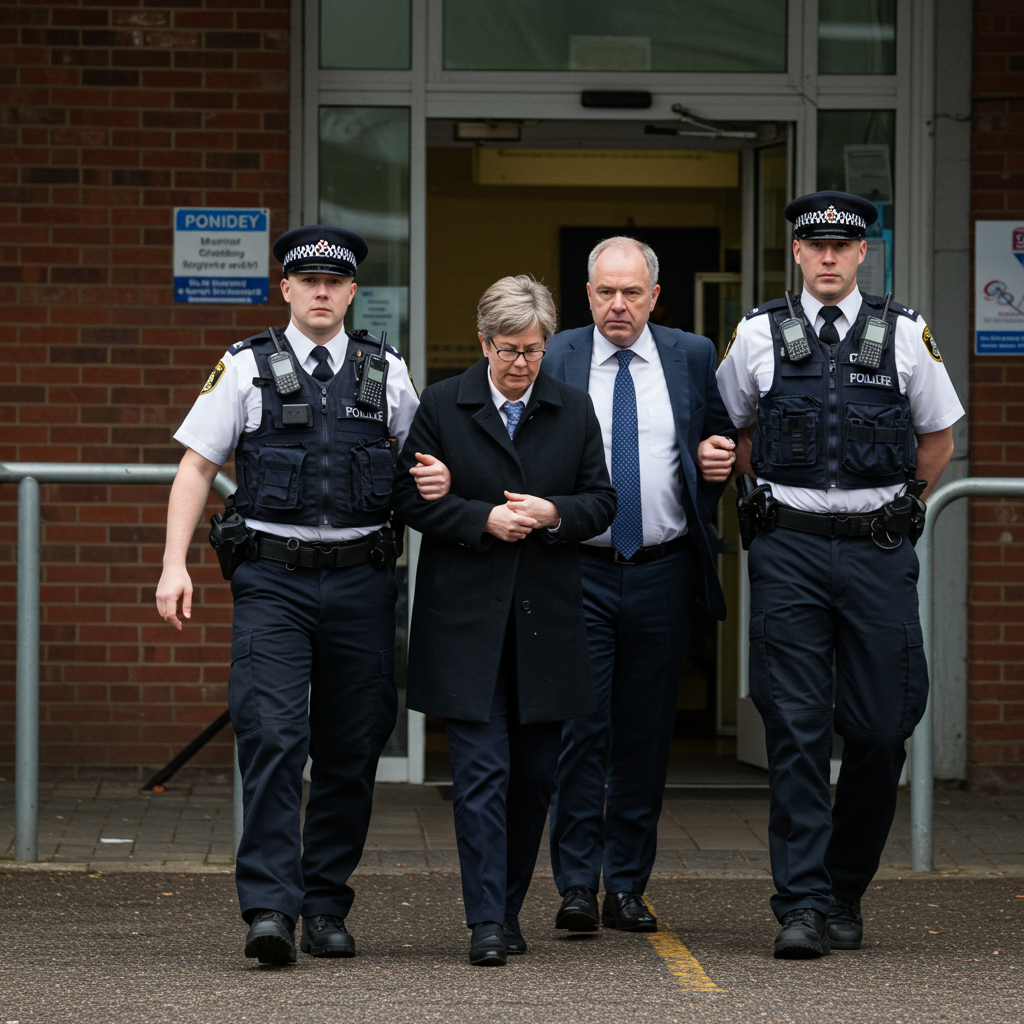Three senior figures connected to the English hospital at the center of the Lucy Letby infant murder convictions have been arrested. Police in northwest England confirmed the arrests on suspicion of gross negligence manslaughter. This development escalates the ongoing scrutiny into the management and decision-making at the Countess of Chester Hospital during the period when numerous babies died or suffered unexplained collapses. The arrests are part of a wider investigation looking into potential corporate manslaughter.
The individuals, whose identities have not been publicly released, previously held senior leadership positions at the hospital. Their arrests are a direct result of an expanded corporate manslaughter investigation launched after former neonatal nurse Lucy Letby was found guilty in 2023. Detective Superintendent Paul Hughes of the Cheshire Constabulary stated the probe is specifically examining the actions and decisions of senior leadership. Authorities are seeking to determine if any criminal conduct contributed to the hospital’s response to the alarming increase in infant fatalities. All three individuals have since been released on bail while the investigation continues.
Police Investigation Targets Senior Decision-Making
The focus of this latest police action is squarely on the hospital’s management structure. Following letby’s conviction for the murders of seven babies and attempts to murder seven others between 2015 and 2016, Cheshire police revisited their investigation. This led to the corporate manslaughter inquiry, which has now broadened to include potential gross negligence manslaughter charges against specific senior personnel. The investigation aims to understand the timeline of events and the actions taken by leadership as concerns about unusual occurrences in the neonatal unit were raised.
Detective Superintendent Hughes emphasized that the investigation is analyzing leadership responses to the escalating levels of deaths and collapses among newborns. This indicates that authorities are looking at whether the hospital’s leadership adequately responded to warnings or signs of potential issues within the unit. The probe into senior leaders is distinct from the original criminal trial that convicted Letby, although it stems directly from the context uncovered during that process. The police have clarified that these new arrests do not affect the validity of Letby’s existing convictions.
The Context: Lucy Letby’s Conviction and Appeals
The arrests occur against the backdrop of the deeply disturbing case of Lucy Letby. Now 35, Letby is serving multiple whole-life sentences for her crimes committed while working as a neonatal nurse at the Countess of Chester Hospital. Prosecutors successfully argued she used various insidious methods to harm vulnerable infants, often leaving little forensic trace. These included injecting air, force-feeding milk, using insulin poisoning, and interfering with breathing tubes. The sheer volume of unexplained incidents in the neonatal unit eventually triggered suspicions that led to the police investigation and her subsequent trial.
Despite the guilty verdicts handed down by two separate juries, Letby maintains her innocence. Support for her position has grown among some legal and medical experts. They raise questions about the circumstantial nature of the evidence and the statistical analysis used by the prosecution during her trial. Her defense team contends she was wrongly convicted. This ongoing debate adds another layer of complexity to the wider scrutiny of the Countess of Chester Hospital.
Challenges to the Conviction and Independent Findings
The case against Lucy Letby continues to face challenges. Letby has already lost two appeals against her convictions. However, her case is now under review by the Criminal Case Review Commission (CCRC). This independent body examines potential miscarriages of justice. A referral from the CCRC could potentially lead to another appeal hearing. The Crown Prosecution Service stands by the convictions, noting the jury verdicts and the appellate court’s rejection of arguments questioning the prosecution’s expert evidence.
Adding further fuel to the debate is the report from an independent panel of international medical experts. This group, led by retired Canadian neonatologist Dr. Shoo Lee, reviewed the medical evidence related to the infant deaths. Their findings, released earlier this year, directly contradicted the prosecution’s case. The panel concluded there was no evidence of murder. Instead, they suggested the deaths likely resulted from natural causes or substandard medical care within the unit. Dr. Lee publicly stated the panel “did not find any murders” in their review.
Hospital Care Under Scrutiny
While the independent medical panel disputed the notion of intentional harm by Letby, their report did not exonerate the Countess of Chester Hospital’s neonatal unit from failings. On the contrary, the experts identified significant deficiencies in the level of medical care provided during the period in question. Their findings painted a concerning picture of a unit where staff were not adequately skilled in critical procedures like resuscitation and intubation.
The report also highlighted a lack of understanding among some medical workers regarding basic procedures. It pointed to instances of misdiagnosing ailments and slow responses in treating acutely ill babies. These findings, distinct from the criminal allegations against Letby, underscore the systemic issues that may have contributed to the tragic events at the hospital. The independent panel’s report has been cited by Letby’s defense team as further evidence that she was wrongly convicted, arguing it demolishes the prosecution’s case.
Public Inquiry Into Systemic Failures
Separate from both the police investigations and the reviews of Letby’s convictions is a public inquiry led by Justice Kathryn Thirlwall. This inquiry was established to conduct a comprehensive investigation into the circumstances surrounding the deaths and collapses of babies at the Countess of Chester Hospital. Its primary focus is not on reviewing Letby’s guilt or innocence but on understanding the systemic failures.
Justice Thirlwall stated at the outset that the inquiry would delve into how failures in staff and management allowed babies to be repeatedly harmed. This includes examining cultural issues, reporting procedures, responses to concerns raised, and the overall standard of care. The inquiry is expected to publish its findings this fall. Its recommendations could lead to significant changes in how hospitals monitor and respond to unexpected increases in patient mortality, particularly in sensitive units like neonatal care.
Calls to Halt the Inquiry and Ongoing Investigations
Following the release of the independent medical panel’s findings that questioned the evidence of murder, Letby’s lawyers and three former hospital executives (believed to be the recently arrested individuals) petitioned Justice Thirlwall to halt the public inquiry. They argued that if Letby’s convictions were eventually overturned, the inquiry’s conclusions might be based on a flawed premise and result in a waste of significant taxpayer funds, estimated at over £10 million ($13.8 million). Justice Thirlwall dismissed this petition, allowing the inquiry to continue its work.
Meanwhile, the Cheshire Constabulary confirmed that the investigation into both corporate and gross negligence manslaughter against senior leadership remains active. There are no set timescales for its completion. Furthermore, Cheshire police are also conducting broader investigations into other deaths and non-fatal collapses of babies that occurred not only at the Countess of Chester Hospital but also at the Liverpool Women’s Hospital between 2012 and 2016, encompassing the period Letby trained there.
Frequently Asked Questions
Why were the hospital leaders arrested?
Three former senior leaders from the Countess of Chester Hospital were arrested on suspicion of gross negligence manslaughter. These arrests are part of an expanded corporate manslaughter investigation launched after nurse Lucy Letby’s 2023 conviction for murdering and attempting to murder babies. The investigation focuses on senior leadership’s decision-making and response to increased infant fatalities during 2015-2016 to determine if criminal negligence occurred. The suspects have been released on bail pending further inquiry.
How do the arrests relate to Lucy Letby’s conviction?
The arrests are directly linked to the context of the baby deaths that occurred at the Countess of Chester Hospital during the period Lucy Letby was found to have committed her crimes. The corporate manslaughter investigation was expanded following her conviction. However, police have explicitly stated that these arrests and the associated investigations into senior leadership do not impact or undermine the validity of Lucy Letby’s convictions for murder and attempted murder.
What is the current status of the Lucy Letby case and related inquiries?
Lucy Letby is serving multiple life sentences but maintains her innocence. Her case is currently under review by the Criminal Case Review Commission (CCRC) after two failed appeals, which could potentially lead to another appeal. Separately, a public inquiry is ongoing, investigating systemic failures at the Countess of Chester Hospital, with findings expected this fall. Police are also conducting broader investigations into baby deaths and collapses, including those at Liverpool Women’s Hospital, alongside the specific probe into senior leadership arrested on manslaughter suspicions.
The arrests of former leaders at the Countess of Chester Hospital mark a significant development in the aftermath of the horrific events and Lucy Letby’s convictions. They underscore the intensive scrutiny now being placed on the actions and inactions of hospital management during a period of tragedy. As the police investigation into potential manslaughter continues and the public inquiry prepares to release its findings, the full picture of systemic failures and accountability at the hospital is still emerging. These parallel processes highlight the multifaceted challenges involved in understanding the causes and consequences of the baby deaths.




